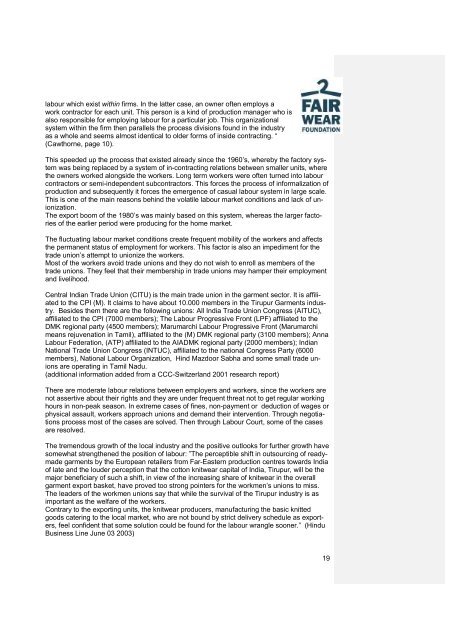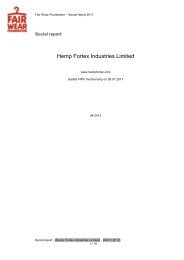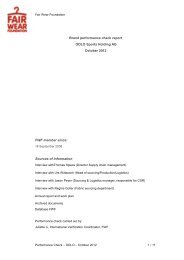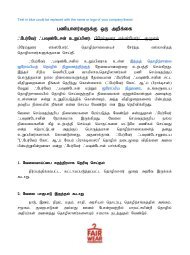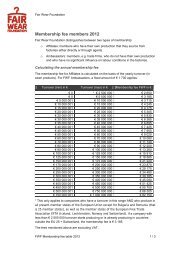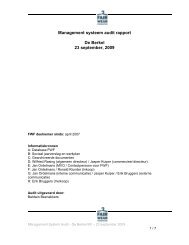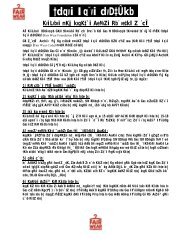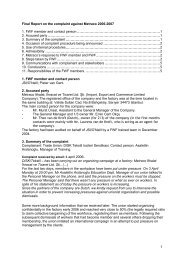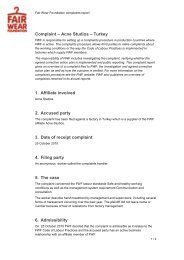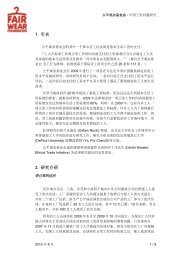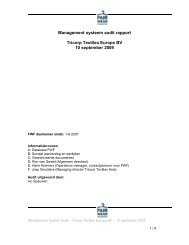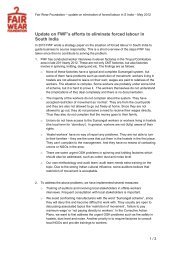Background Study Tirupur - Fair Wear Foundation
Background Study Tirupur - Fair Wear Foundation
Background Study Tirupur - Fair Wear Foundation
Create successful ePaper yourself
Turn your PDF publications into a flip-book with our unique Google optimized e-Paper software.
labour which exist within firms. In the latter case, an owner often employs a<br />
work contractor for each unit. This person is a kind of production manager who is<br />
also responsible for employing labour for a particular job. This organizational<br />
system within the firm then parallels the process divisions found in the industry<br />
as a whole and seems almost identical to older forms of inside contracting. “<br />
(Cawthorne, page 10).<br />
This speeded up the process that existed already since the 1960’s, whereby the factory system<br />
was being replaced by a system of in-contracting relations between smaller units, where<br />
the owners worked alongside the workers. Long term workers were often turned into labour<br />
contractors or semi-independent subcontractors. This forces the process of informalization of<br />
production and subsequently it forces the emergence of casual labour system in large scale.<br />
This is one of the main reasons behind the volatile labour market conditions and lack of unionization.<br />
The export boom of the 1980’s was mainly based on this system, whereas the larger factories<br />
of the earlier period were producing for the home market.<br />
The fluctuating labour market conditions create frequent mobility of the workers and affects<br />
the permanent status of employment for workers. This factor is also an impediment for the<br />
trade union’s attempt to unionize the workers.<br />
Most of the workers avoid trade unions and they do not wish to enroll as members of the<br />
trade unions. They feel that their membership in trade unions may hamper their employment<br />
and livelihood.<br />
Central Indian Trade Union (CITU) is the main trade union in the garment sector. It is affiliated<br />
to the CPI (M). It claims to have about 10.000 members in the <strong>Tirupur</strong> Garments industry.<br />
Besides them there are the following unions: All India Trade Union Congress (AITUC),<br />
affiliated to the CPI (7000 members); The Labour Progressive Front (LPF) affiliated to the<br />
DMK regional party (4500 members); Marumarchi Labour Progressive Front (Marumarchi<br />
means rejuvenation in Tamil), affiliated to the (M) DMK regional party (3100 members); Anna<br />
Labour Federation, (ATP) affiliated to the AIADMK regional party (2000 members); Indian<br />
National Trade Union Congress (INTUC), affiliated to the national Congress Party (6000<br />
members), National Labour Organization, Hind Mazdoor Sabha and some small trade unions<br />
are operating in Tamil Nadu.<br />
(additional information added from a CCC-Switzerland 2001 research report)<br />
There are moderate labour relations between employers and workers, since the workers are<br />
not assertive about their rights and they are under frequent threat not to get regular working<br />
hours in non-peak season. In extreme cases of fines, non-payment or deduction of wages or<br />
physical assault, workers approach unions and demand their intervention. Through negotiations<br />
process most of the cases are solved. Then through Labour Court, some of the cases<br />
are resolved.<br />
The tremendous growth of the local industry and the positive outlooks for further growth have<br />
somewhat strengthened the position of labour: ”The perceptible shift in outsourcing of readymade<br />
garments by the European retailers from Far-Eastern production centres towards India<br />
of late and the louder perception that the cotton knitwear capital of India, <strong>Tirupur</strong>, will be the<br />
major beneficiary of such a shift, in view of the increasing share of knitwear in the overall<br />
garment export basket, have proved too strong pointers for the workmen’s unions to miss.<br />
The leaders of the workmen unions say that while the survival of the <strong>Tirupur</strong> industry is as<br />
important as the welfare of the workers.<br />
Contrary to the exporting units, the knitwear producers, manufacturing the basic knitted<br />
goods catering to the local market, who are not bound by strict delivery schedule as exporters,<br />
feel confident that some solution could be found for the labour wrangle sooner.” (Hindu<br />
Business Line June 03 2003)<br />
19


